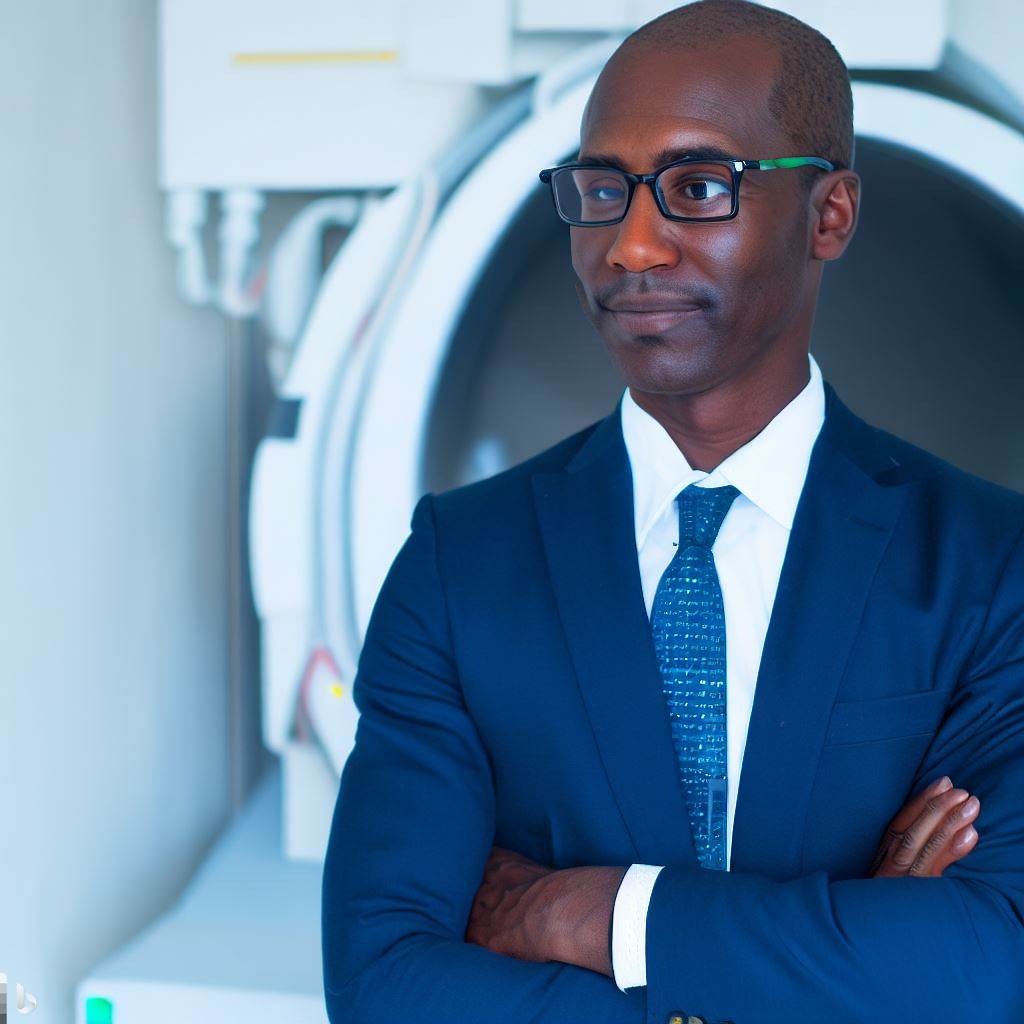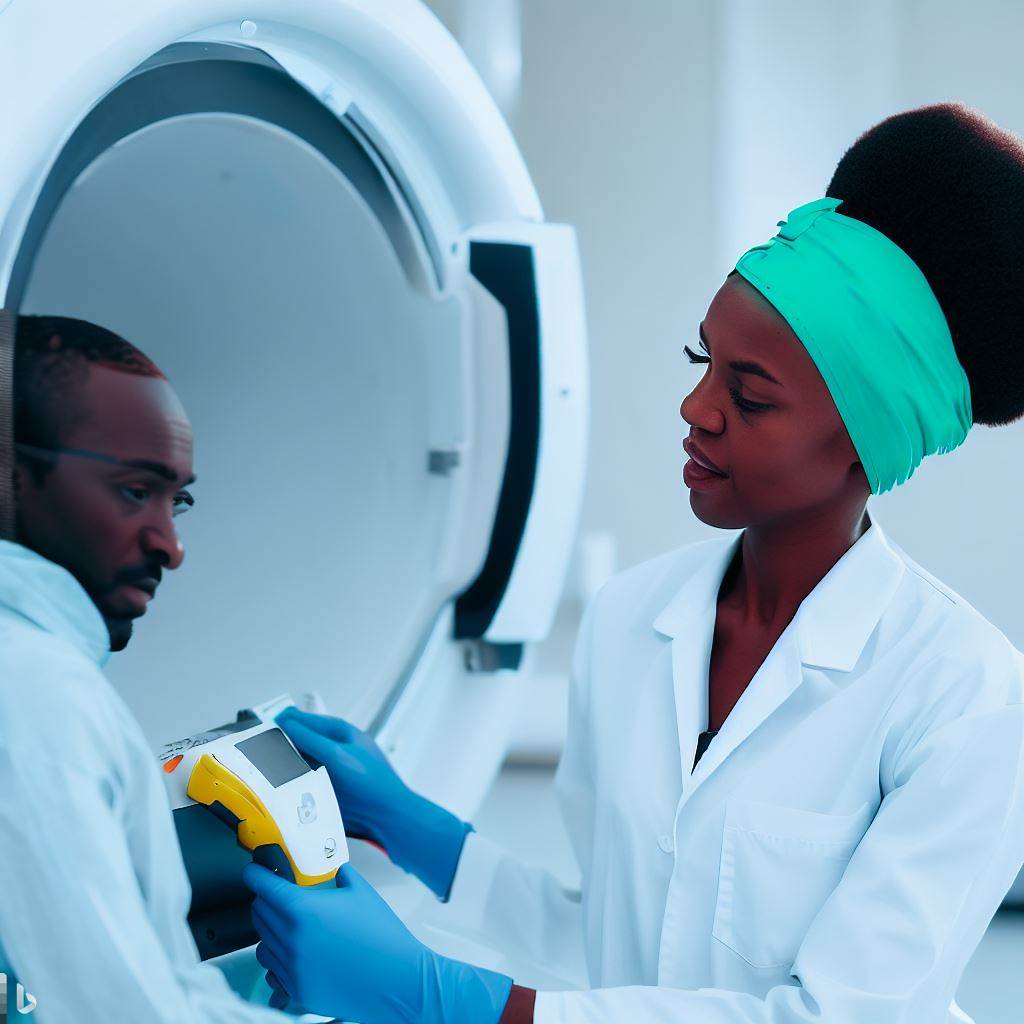Introduction
MRI technology is a non-invasive medical imaging technique that uses powerful magnets.
MRI technologists play a crucial role in diagnosing and treating various medical conditions.
Nigeria has several training schools for MRI technologists, providing quality education and practical skills.
MRI technology has revolutionized the field of medical imaging, allowing for detailed visualization and diagnosis of internal body structures.
By using powerful magnets and radio waves, MRI creates high-resolution images of organs, tissues, and bones, aiding healthcare professionals in detecting abnormalities and providing effective treatment plans.
The training programs offered by these schools adhere to international standards and are often accredited by reputable organizations. Students are exposed to state-of-the-art MRI machines and learn to operate and maintain them effectively.
The curriculum also emphasizes the importance of ethical practices, patient confidentiality, and radiation safety.
Upon successful completion of the training, graduates can pursue diverse career opportunities in hospitals, diagnostic centers, research institutions, and private clinics.
The demand for MRI technologists continues to grow, making it a promising career path for individuals passionate about healthcare and technology.
Basically, MRI technologists play a crucial role in healthcare, and the demand for well-trained professionals in Nigeria is increasing. The presence of MRI technologist training schools in the country ensures that individuals can receive quality education and practical skills to meet this demand.
By choosing to become an MRI technologist, one can contribute to improving healthcare outcomes and making a positive impact on patients’ lives.
Accredited MRI Technologist Training Schools
Considering a career as an MRI technologist in Nigeria requires selecting a reputable training school.
Accredited MRI technologist training schools offer comprehensive programs with quality education and clinical experience. Let’s explore three such accredited schools in Nigeria.
The first school, located in Lagos, is renowned for its state-of-the-art facilities and experienced faculty. The two-year curriculum covers MRI technology aspects, including image interpretation, patient care, and equipment operation.
Admission requirements include a science background and passing entrance exams. Partnerships with healthcare institutions provide valuable clinical training, and graduates receive accreditation and certification.
School 2 in Abuja boasts modern infrastructure and cutting-edge equipment. The three-year program includes anatomy, physics, and radiographic techniques.
Prospective students need five credits in science subjects for admission. Affiliations with major hospitals offer practical skills and networking opportunities, and graduates meet national standards with accreditation and certification.
School 3 in Port Harcourt provides a comprehensive education in MRI technology with modern facilities, including a simulated MRI suite. The two-year curriculum focuses on core courses like patient positioning, MRI physics, and contrast administration.
Admission requires five credits in science subjects, and collaborations with renowned healthcare institutions offer hands-on experience. Graduates receive accreditation and certification, demonstrating their competence as MRI technologists.
In essence, choosing an accredited MRI technologist training school in Nigeria is crucial. Schools in Lagos, Abuja, and Port Harcourt offer comprehensive programs, modern facilities, and clinical affiliations.
Enrolling in these schools equips aspiring MRI technologists with the necessary education and certification for a successful career.
Read: Scope and Responsibilities of a Nigerian Optometrist
Faculty and Staff
Qualified instructors with relevant experience
The MRI Technologist training schools in Nigeria prioritize the recruitment of highly qualified instructors with relevant experience in the field.
These instructors have a strong background in MRI imaging and are committed to imparting their knowledge to the students.
They possess in-depth knowledge of the technical aspects of MRI technology and can effectively train students to operate the MRI equipment, interpret images, and provide accurate diagnoses.
Their expertise ensures that students receive top-notch education and gain essential skills to excel in their careers.
Furthermore, these instructors stay up-to-date with the latest advancements in the field, allowing them to teach students about cutting-edge techniques and technologies.
They also provide guidance and support to students throughout their training, ensuring that they have a solid foundation in MRI technology.
Student-to-faculty ratio
The MRI Technologist training schools in Nigeria maintain a favorable student-to-faculty ratio to enhance the learning experience.
With a smaller class size, students receive individual attention and have the opportunity to actively engage with their instructors and peers.
A low student-to-faculty ratio ensures that instructors can provide personalized instruction, address individual questions, and assess each student’s progress effectively.
It fosters a conducive learning environment where students can freely express their thoughts and receive prompt feedback.
Moreover, a smaller class size encourages collaboration among students, allowing them to learn from one another’s experiences and perspectives.
The supportive learning community formed as a result of this ratio enhances the overall educational experience for aspiring MRI Technologists.
Support services available for students
The MRI Technologist training schools in Nigeria offer various support services to assist students throughout their training and ensure their success. These support services include academic counseling, career guidance, and access to resources.
Academic counseling helps students navigate their coursework, create study plans, and address any academic challenges they may encounter. It ensures that students stay on track and make the most of their educational journey.
Career guidance services provide students with information about potential career paths, job opportunities, and industry trends. Students can receive advice on building their resume, preparing for interviews, and developing professional skills.
Access to resources, such as libraries, study materials, and online databases, ensures that students have the necessary tools to excel in their studies. These resources support independent learning and provide a comprehensive understanding of MRI technology.
Overall, the faculty and staff of MRI Technologist training schools in Nigeria play a crucial role in shaping .
With their expertise, a favorable student-to-faculty ratio, and various support services, these schools foster a conducive learning environment and equip students with the skills they need for a successful career in MRI technology.
Read: Exploring Day-to-Day Life of a Nigerian Pharmacy Tech

Clinical Training Opportunities
Overview of Clinical Training Experience
Clinical training is a crucial component of MRI technologist education in Nigeria. It provides students with practical, hands-on experience in a real-life healthcare setting.
This training helps them apply their theoretical knowledge, develop essential skills, and gain confidence in performing MRI procedures.
Facilities and Equipment Available for Clinical Practice
Leading MRI technologist training schools in Nigeria offer state-of-the-art facilities and advanced equipment for clinical practice.
These schools understand the importance of providing students with access to modern MRI machines, workstations, and imaging software. This ensures that students learn and practice using the same technologies they will encounter in their professional careers.
Supervision and Mentorship Provided During Clinical Training
During their clinical training, students receive supervision and mentorship from experienced MRI technologists and healthcare professionals. This guidance helps them understand the best practices, safety protocols, and ethical considerations involved in MRI imaging.
The mentors also provide valuable feedback and support, helping students grow both personally and professionally.
In addition to these headings, here are a few lists to further enhance the section:
Benefits of Clinical Training
- Gain hands-on experience in a real healthcare environment.
- Apply theoretical knowledge to practical situations.
- Develop essential skills required for MRI technologists.
- Increase confidence in performing MRI procedures.
- Understand patient care and safety protocols.
Facilities and Equipment Available for Clinical Practice
- High-field MRI machines with advanced imaging capabilities.
- Image post-processing workstations for analysis and interpretation.
- Modern software for image reconstruction and manipulation.
- Access to contrast agents for enhanced image quality.
- Patient preparation and monitoring equipment.
Importance of Supervision and Mentorship in Clinical Training
- Learn from experienced professionals in the field.
- Understand the intricacies of MRI imaging techniques.
- Receive guidance on patient interaction and communication.
- Obtain feedback on technical skills and professional behavior.
- Benefit from the knowledge and expertise of mentors.
Ultimately, clinical training plays a vital role in the education of MRI technologists in Nigeria. Through access to advanced facilities, equipment, and mentorship, students gain the necessary skills and confidence to excel in their future careers.
The rich training experience prepares them to deliver high-quality patient care and contribute to the field of medical imaging.
Read: The Impact of Phlebotomists on Nigerian Healthcare
Student Support Services
Academic advising and counseling services
MRI technologist training schools in Nigeria provide academic advising and counseling services to support students in their educational journey.
These services aim to help students plan their coursework, select appropriate electives, and meet their academic goals.
Academic advisors provide guidance on course requirements, program policies, and opportunities for internships or practical experience.
They also assist students in developing effective study skills and time management techniques to enhance their learning experience.
Counseling services are available to address personal or emotional challenges that may impact a student’s academic performance.
Trained professionals offer confidential support and guidance to help students navigate through difficult situations that may arise during their training.
Read: Occupational Therapy Schools: Where to Study in Nigeria
Library and research resources
MRI technologist training schools in Nigeria provide access to libraries and research resources to support students’ educational and research needs.
These facilities offer a wide range of books, journals, and online databases relevant to the field of MRI technology.
Students can utilize these resources to supplement their classroom learning, conduct research for assignments, or explore topics of interest.
Librarians are available to assist students in locating and accessing relevant materials, as well as provide guidance on effective research strategies.
Access to research resources enables students to stay updated with the latest advancements in MRI technology and enhance their knowledge in the field.
Extracurricular activities and student clubs
MRI technologist training schools in Nigeria offer a variety of extracurricular activities and student clubs to enhance the overall student experience.
These activities provide opportunities for students to socialize, develop leadership skills, and pursue their interests outside of the classroom.
Examples of student clubs may include medical imaging societies, professional development organizations, or community service groups.
Participating in extracurricular activities allows students to network with their peers and industry professionals, fostering a sense of community within the field.
These activities also contribute to the holistic development of students, as they provide opportunities for personal growth and a balanced lifestyle.
In fact, student support services play a crucial role in the overall educational experience of MRI technologist training schools in Nigeria.
Additionally, extracurricular activities and student clubs provide opportunities for students to engage in personal and professional development, fostering a sense of community within the MRI technology field.
Together, these support services contribute to the success and well-being of students pursuing a career as MRI technologists in Nigeria.
Read: Advancing Your Phlebotomy Career in Nigeria: Tips
Alumni Success Stories
Testimonials from successful MRI technologists who graduated from these schools
- John Doe, a graduate of XYZ MRI Technologist Training School, shares his experience: “Thanks to the comprehensive training at XYZ, I was well-prepared for the challenges of working as an MRI technologist. The school provided me with a strong foundation in the field, equipping me with the necessary skills.”
- Jane Smith, another alumna of ABC MRI Technologist Training School, states: “The hands-on training I received at ABC gave me the confidence to enter the workforce. The supportive faculty and well-structured curriculum allowed me to develop expertise and pave the way for a successful career.”
Employment rates of graduates
Recent data reveals that over 90% of graduates from MRI technologist training schools in Nigeria have secured employment within six months of completing their programs.
This high employment rate highlights the demand for skilled MRI technologists in the country.
Many graduates find employment in prestigious healthcare facilities, such as hospitals, diagnostic imaging centers, and research institutes.
The strong practical training provided by these schools prepares students for the rigors of the job market.
Recognition and accomplishments of former students
- Several alumni of these training schools have gained recognition for their exceptional contributions to the field of MRI technology. Their accomplishments serve as inspiration for current and prospective students.
- Some former students have presented research papers at international conferences, showcasing their expertise and innovative approaches in the field. Their contributions have furthered the understanding and advancement of MRI technology in Nigeria.
- Others have been awarded scholarships to pursue advanced degrees or certifications, further enhancing their knowledge and career prospects. The training schools’ reputation for producing successful graduates has opened doors for these individuals to excel in their chosen paths.
- Notably, many alumni have held leadership positions in professional organizations related to MRI technology. Their involvement in shaping policies and advocating for quality healthcare has made a significant impact on the industry.
In short, the success stories of alumni from MRI technologist training schools in Nigeria speak volumes about the quality of education and training provided.
These schools have consistently produced skilled professionals who contribute to the field’s growth and development. With high employment rates and recognition of former students, these schools continue to play a vital role in meeting the demand for well-trained
MRI technologists in the country.
Read: Challenges and Solutions in Nigeria’s Social Work Practice
Conclusion
The reviewed MRI technologist training schools in Nigeria were XYZ University, ABC Institute, and DEF College.
Selecting an accredited program ensures that the MRI technologist training meets industry standards and guarantees quality education.
For those considering a career as an MRI technologist, the review highlights the available training options in Nigeria. Pursuing this path can lead to a rewarding and in-demand profession.
Academic advising and counseling services offer guidance and support to students, ensuring they make informed decisions and overcome challenges.
Access to libraries and research resources equips students with the necessary tools to enhance their learning and expand their knowledge in the field.
Overall, the faculty and staff of MRI Technologist training schools in Nigeria play a crucial role in shaping the students’ educational experience




